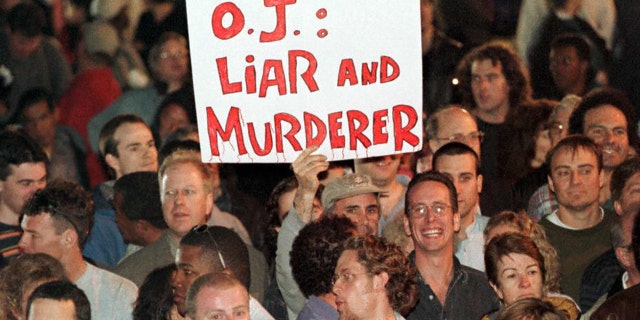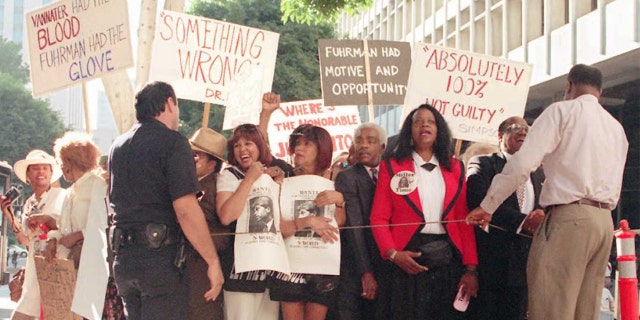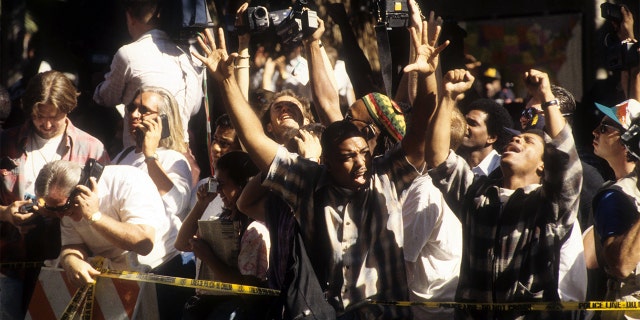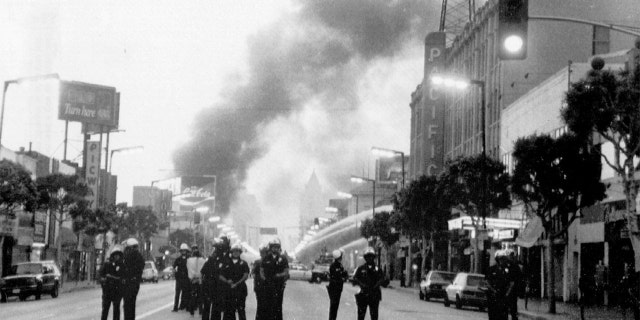Jurors in the trial of former Minneapolis police officer Derek Chauvin began deliberations Monday, as defense attorneys voiced concerns about the lack of sequestering given the extensive media coverage the death of George Floyd has received.
As the nation awaits the verdict, authorities around the country are preparing for possible protests and unrest.
Nearly three decades ago, fears of violence and a divided public also awaited another verdict in the high-profile trial of O.J. Simpson, who was accused of brutally killing his ex-wife, Nicole Brown Simpson, and Ronald Goldman in Los Angeles.
Unlike the jury in Chauvin’s trial, jurors in the 1995 Simpson trial were sequestered for nearly nine months as they heard testimony from dozens of witnesses before rendering a controversial not guilty verdict after less than four hours of deliberation. The media exposure of the trial was the first of its kind, with news outlets dedicating 24-hour coverage to the trial and analysis.
Crowds of supporters and Simpson opponents gathered daily at the courthouse as prosecutors and Simpson’s defense lawyers — nicknamed the “Dream Team” — made their arguments in what was dubbed the “trial of the century.”

SANTA MONICA, UNITED STATES: Spectators outside the Santa Monica, California, courthouse, hold an-anti O.J Simpson placard as they react to the guilty verdicts in the Simpson wrongful death civil trial 04 February. Simpson was found liable for the deaths of his ex-wife Nicole Brown Simpson and her friend Ron Goldman. (Photo credit should read HECTOR MATA/AFP via Getty Images)
Chauvin faces second and third-degree murder as well as manslaughter charges in the death of George Floyd on May 25, 2020.
On Monday, Chauvin defense attorney Eric Nelson voiced concerns about the potential for jurors to be influenced by the media attention given that they are allowed to go home each day.
“I just don’t know how this jury can really be… that they are free from the taint of this,” he told Hennipen County Judge Peter Cahill after closing arguments.
One former Simpson juror, David Aldana, told Fox News in 2004 that if he ever summoned to serve on a jury again: “I would do anything in my power to get out of it.”

Protestors are held back by the police outside the Criminal Courts Building where the O.J. Simpson double-murder trial was being held in downtown Los Angeles. The protestors chanted “release the tapes” in anticipation of former Los Angeles Police Detective Mark Fuhrman retaking the witness stand today. AFP PHOTO (Photo credit should read AFP/AFP via Getty Images)
Many, including other police officers, have stated they believe Chauvin used excessive force when he pinned his knee of Floyd’s neck on May, 25 of last year. Video footage of the incident unleashed a reckoning on race and policing that still continues.
In anticipation of a guilty verdict, authorities in Los Angeles increased police shifts and some businesses took measures to protect their property over fears of unrest.
The Simpson trial left a deeply divided public, much along racial lines.
Video footage of crowds reacting to the not guilty verdict in real time showed many Black people reacting with joy while White viewers were visibly shocked and disappointed. Many minorities felt Simpson was being framed by the Los Angeles Police Department, which had a fraught history with the minority communities it served up to that point.

The crowd cheers after hearing the decision of the O.J. Simpson verdict at the Los Angeles Courthouse on October 3, 1995. (Photo by Michael Montfort/Michael Ochs Archives/Getty Images)
CLICK HERE TO GET THE FOX NEWS APP
Their views felt validated when prosecution witness Det. Mark Fuhrman was caught on tape repeatedly saying the N-word. At the time of the trial, Los Angeles was still reeling from the 1992 riots following the acquittal of four white officers accused of beating Rodney King.
A pivitol moment for the prosecution came when Christopher Darden asked Simpson to try on gloves thought to be used in the murder in the courtroom. When they didn’t appear to fit, defense lawyer Johnnie Cochran uttered his infamous phrase: “If it doesn’t fit, you must acquit.”

Police guard Hollywood Boulevard on May 1, 1992 after the Rodney King incident sparked riots. (Photo by Dayna Smith/The Washington Post via Getty Images)
Simpson was eventually convicted of armed robbery and other charges and was released from a Nevada prison in 2017 after nine years.